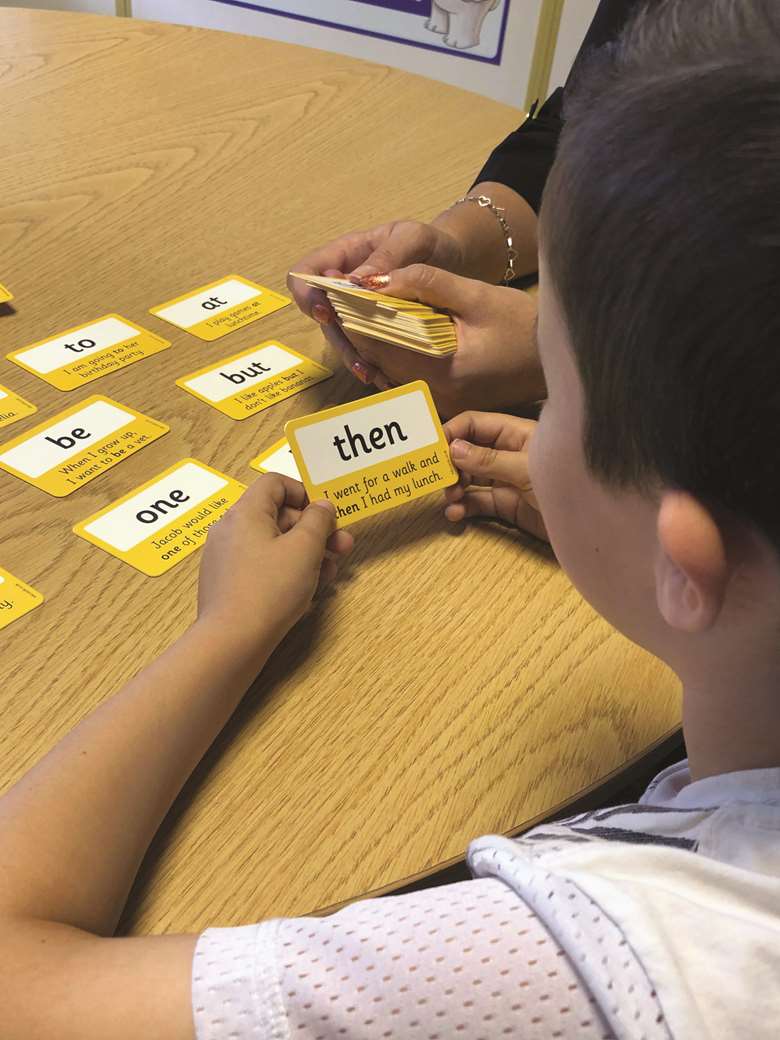How to support home reading
SponsoredMonday, September 30, 2019
Sally Player, Foundation Stage leader at Quilters Infant School in Billericay, Essex, urges teachers to adopt a creative approach to ensure all new children develop a love of reading, and recommends resources such as 100 High Frequency Wordcards.

'My child loves books!’, many parents declare when their child starts their Reception year with me, listing favourite texts that can be recited off by heart and occasionally showing video evidence on their phone with justifiable pride. These children start school having already embarked upon the exciting learning journey to becoming a fluent and enthusiastic reader. But of course, not all children start school with such reading experiences, and this is just one of the many challenges that practitioners face when developing early reading skills.
The new baseline assessment (September 2020) and planned changes to the Early Learning Goals (September 2021) may present us with yet more challenges across all areas of learning, but in reading, there are issues which I have encountered year on year which seem unlikely to change.
The broad spectrum of reading experiences that children have before they start school,
as mentioned above, means that they need an equally broad range of planned reading strategies to meet their individual needs. However, both limited parental engagement and ‘over-supportive’ parental engagement can present challenges.
Listening and attention
Handing a child a book and inviting them to look at it gives me the first window into their reading world. They may struggle to turn a book the right way up, to open the cover and to turn the pages, but this is not always because they have little experience of sharing stories
at home. For many children with rich reading opportunities, it seems that they have not been actively engaged in the physical activity of handling books, but have sat passively as pages are turned for them.
However, when presented with a tablet, nearly all children will confidently tap, click and swipe, navigating their way around apps with commendable independence. Books now have to compete for children’s attention in environments that continually present visual and audible distractions. Activities that are not sufficiently engaging can be dismissed at
the touch of a button and instantly replaced by something more appealing. It is, therefore, no surprise that some children find it difficult to listen attentively to a story and to retain concentration.
Choosing words carefully
Understanding the acquisition of early reading skills, especially phonics, can be challenging
for colleagues in other Key Stages, so it is hardly surprising that parents are nervous about supporting their child correctly in this. Cries of ‘I don’t want to do it wrong’ and ‘It’s so different from when I was at school’ are commonplace and understandable. Parents who are already actively involved in developing their child’s reading skills may also have, with the best of intentions, taught their child to recognise graphemes by name (m – em) not sound (m – mmm). Every year without fail, once our phonics programme has begun, there is always a child who announces with disdain that their parent is not pronouncing the sounds properly – ‘I’ve told her it’s mmm but she keeps saying muh!’.
With so many parents at work, running workshops in school hours can have limited success and emailing to parents a powerpoint presentation littered with phonic terminology such as phoneme and digraph can be daunting to read. Making videos of phonics lessons available on the school website has proved to be much more successful in upskilling parents, and the children love them too.
With the heavy emphasis on phonics as the prime approach to teaching reading, and mindful of the Year One Phonics Screening Check, we have the challenge of teaching children, and parents, the concept of ‘tricky words’, ‘high frequency words’ and ‘alien words.’ As a child hesitates to read the word chimpanzee , it’s tempting to say ‘It’s a bit tricky!’ when we have taught them that ‘tricky’ means non-decodable; we need to choose our words carefully to avoid confusion!
Resourcing for early reading
Developing early reading skills requires creative and innovative resourcing. Practitioners need to repeatedly present the same content in a variety of ways to ensure that it is embedded, enabling children to become fluent readers. I spend hours searching for new songs, videos, games and activities to retain the interest of the children (and my own enthusiasm) as familiar content is revisited. One essential resource in my toolkit is sets of High Frequency Word Cards which children can be given as a challenge to learn with their parents. Once a child has a good sight recognition of these key words it really helps improve their fluency. Such resources are hugely time-consuming to make and we need to weigh up the value and impact of spending hours making bespoke materials for our class against purchasing commercially produced products readily available online (100 High Frequency Wordcards are available from primaryteaching.co.uk/wordcards).
Early years practitioners are skilled at encouraging children to embrace challenge and to persevere. We want them to innovate, to take risks and to be resilient if things go wrong. Let’s adopt this approach for ourselves as we start a new school year in which more young children will learn from us the love and the skills of reading.
Find out more here
First published on Early Years Educator 30/09/2019




